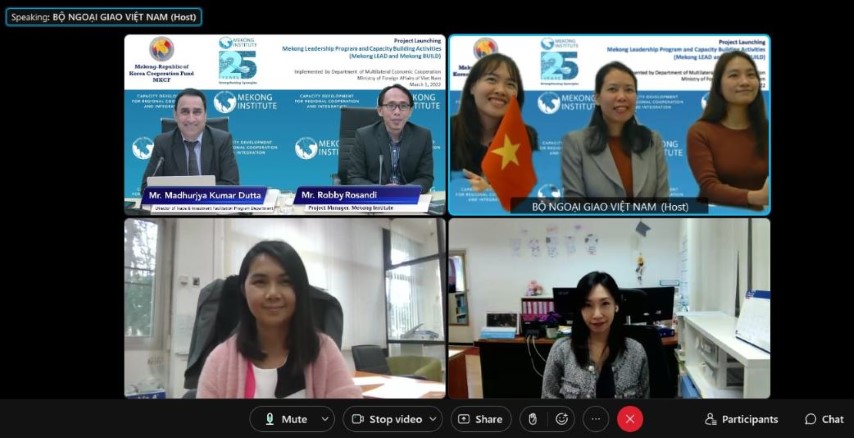To comprehensively involve high-level policymakers in exchanging views, building mutual understanding, and developing policy options for proactive regional planning and coordinated management operation, the Department of Multilateral Economic Cooperation of the Ministry of Foreign Affairs of Vietnam launched the Mekong Leadership Program and Capacity Building Activities (Mekong LEAD and Mekong BUILD) in a virtual event on March 1, 2022.
The program, which is funded by the Mekong-Republic of Korea Cooperation Fund (MKCF), through the fund management and coordination of the Mekong Institute (MI), will also serve as a capacity-building platform and a knowledge resource on critical issues of regional interest.
In his opening remarks, Mr. Madhurjya K. Dutta, MKCF coordinator and Director of Trade and Investment Facilitation Department of MI, emphasized the challenge of “addressing the uneven distribution of knowledge and capacity among countries and building trust and confidence in the added value of region-wide cooperative actions.” He shared that regional cooperation initiatives have been very successful, particularly in infrastructure development. However, challenges lie on the ‘software’ aspects of development, such as cross-border transportation and transit agreements, trade facilitation, customs harmonization, health and sanitary and phytosanitary measures, and harmonization of standards.
Mr. Dutta stressed that the Mekong countries should “build a strong national agency which can coordinate various agencies and priority areas, including the ‘software’” part of development, negotiating regional agreements, and monitoring implementation.” He also added that the institutional capacity of Mekong countries is uneven and it is necessary to address this to maintain the momentum of regional cooperation in the region.
Ms. Nguyen Thi Bich Thuy, the Project Director In-charge, provided the background and the strategies of the two-year project. The team envisioned the project to directly engage Mekong high level policymakers and senior officials, both at the central and local levels, through intensive trainings and policy exchange sessions. The project aims: to bring policy makers in building more understanding and developing policy options; to provide a platform for analysis on Mekong critical issues (i.e., water management, climate change response); and to promote the network of high-level leaders in the region, from provinces, academia, and businesses.
Ms. Thuy shared the two components of the projects: the Mekong LEAD and the Mekong BUILD. The Mekong LEAD will provide a platform for Mekong leadership engagement and interaction on the regional development issues. Through a training program, which will be facilitated by a prestigious University or research institute in the region and in Korea, specific thematic issues related to the region’s social and economic development will be shared by experts with Mekong participants in a dynamic and free flowing sessions.
On the other hand, Mekong BUILD will create a solid foundation of research to support Mekong LEAD, which will make research relevant to evidence-based policy making process. Under Mekong BUILD, researches will be conducted to check the current condition, changes, and outlook for the Mekong region highlighting the challenges and opportunities facing the region and the strategy to ensure sustainable development. Workshops will be conducted to share the relevant research findings and to enhance dialog between local businesses and government agencies. The workshop can also promote more frequent exchanges of views on how government can effectively support local businesses and people.
Towards the latter part of the meeting, Mr. Robby Rosandi of MKCF and Ms. Phinyada Foytong of the Finance Department of MI presented the MKCF project monitoring and reporting guidelines.








